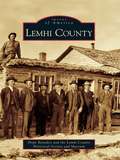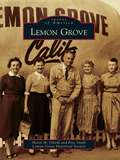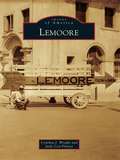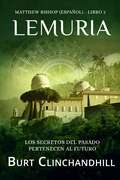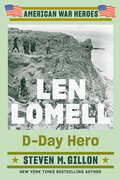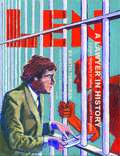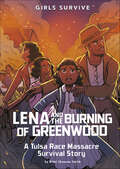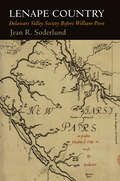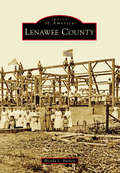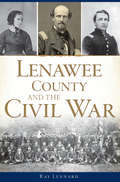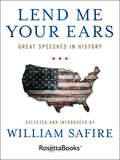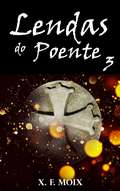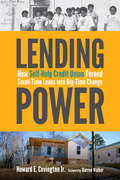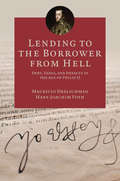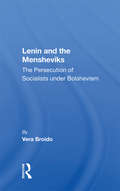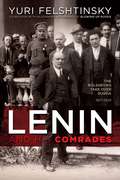- Table View
- List View
Lemhi County
by Hope Benedict Lemhi County Historical Society and MuseumSituated at the base of the Continental Divide and surrounded by the Lemhi and Salmon River Ranges, Lemhi County, Idaho, provides a fascinating look at the "Old West" as it makes its precarious transition to a new order. Traditional homeland to the people of Sacajawea, Lemhi County became a destination point for Lewis and Clark as they worked their way across the continent, for trappers, for missionaries, and finally, in 1866, for prospectors and those who kept them fed, clothed, and entertained. The community that developed in the valleys of the Salmon, Lemhi, and Pahsimeroi Rivers benefited from long-term mining and the simultaneous evolution of ranching and the timber industry, and this growth was well documented by local photographers.
Lemon Grove: Lemon Grove's Ace Drive-in, A Symbol Of Its Time (Images of America)
by Helen M. Ofield Lemon Grove Historical Society Pete SmithLemon Grove dates to 1892 when it first appeared in the San Diego County records as "Lemon Grove." The tiny, whistle-stop town emerged during the "second gold rush," the rise of California's citrus industry, which was facilitated by the 1849 Gold Rush, the break up of the Mexican ranchos in Alta California, and the advent of statehood for California in 1850. Land speculators poured into California, lured by the exquisite climate, five growing seasons, and the possibilities for success in agriculture and business. Lemon Grove became home to gentlemen farmers from the East and Midwest, whose descendants live on in the community to this day.
Lemoore
by Judy Cox-Finney Cynthia J. WrightThe Tachi-Yokut Indians made a subsistence living around the great inland sea known as Tulare Lake, near present-day Lemoore, long before Dr. Laverne Lee Moore came to town in 1871. Still before Moore came other Anglo settlers. The Rhoads family settled and built an adobe house, which remains today, where Daniel and Sarah Rhoads raised a family, ranched, and did business in 1856. Rhoads was part of the group that rescued the ill-fated Donner party. The U.S. Post Office saw fit to name the town after its founder. During World War II, Lemoore was the site of a U.S. Army Air Force training camp. Since 1963, it has been home to one of the largest inland U.S. air bases: Naval Air Station Lemoore.
Lemuria (Matthew Bishop (Español) #2)
by Burt ClinchandhillLos secretos del pasado pertenecen al futuro. Cuando en todo el mundo desaparecen las últimas tribus vivas aisladas, el profesor Matthew Bishop se ve arrastrado de nuevo, sin quererlo, a una aventura que le llevará por todo el globo. Su interés personal aumenta cuando su íntima amiga Jennifer Porter desaparece y parece estar implicada de algún modo. Siguiendo las pistas ocultas, y con la ayuda del Vaticano y de viejos amigos, Bishop descubre la verdad sobre el siguiente paso en la evolución. Es una verdad que no termina en esta Tierra, sino que podría muy bien significar el final de ella, en un viaje a través de tres continentes y hacia los cielos. EVOLVED PUBLISHING PRESENTA el segundo libro de la serie "Matthew Bishop" de thrillers de conspiraciones religiosas, ideal para fans de Dan Brown y Michael Crichton.
Len Lomell: D-Day Hero (American War Heroes)
by Steven M. GillonThe exhilarating, inspiring story of Len Lomell, an Army Ranger who on D-Day almost single-handedly knocked out the big German guns before they could fire on the American invasion force, and whose later exploits spanned the most dramatic battles of World War II. Len Lomell was drafted to the United States Army in 1942, became an Army Ranger, and was soon sent to England to prepare for the D-Day invasion. At Point du Hoc, Lomell and his men were given a daunting mission—to scale the steep cliffs and disable the big German guns at the top, guns that could otherwise destroy the rest of the D-Day landing fleet. Despite incredible odds, it was a mission that Lomell completed almost single-handedly. In this stirring, action-packed book, Gillon details the incredibly heroic actions on D-Day—and throughout World War II—that ultimately won Lomell the Distinguished Service Cross, a Silver Star, and a Bronze Star. Lomell was later praised by Stephen Ambrose as the single most important person in the success of D-Day after General Eisenhower. With propulsive writing, nuanced research, and multiple personal interviews with Lomell, Gillon brings an unforgettable WWII hero to life, finally giving him the recognition he so richly deserves.
Len, A Lawyer in History: A Graphic Biography of Radical Attorney Leonard Weinglass
by Paul Buhle Seth Tobocman Michael Steven SmithFor half a century, criminal defense lawyer Leonard Weinglass defended a who's who of the twentieth-century left in some of America's most spectacular trials. "The typical call I get is one that starts by saying, 'You're the fifth attorney we've called,'" he once said. "Then I get interested." Those calls came from the likes of the SDS, the Chicago Seven, Daniel Ellsberg, Abbie Hoffman, and Mumia Abu-Jamal, among many others.In a field dominated by egomaniacs, Weinglass was known for his humility, his common touch, his ability to work collectively, his kindness, and his attention to detail. This long-overdue biography captures the vibrant life and inspiring legacy of an American iconoclast.Praise for Len, A Lawyer in History"For decades Seth Tobocman has been working within the comics vernacular to create a unique language, and with Len he's at the top of his game...brilliantly applying himself not only with pencil and ink on paper, but as an active participant in the same political struggles that Len Weinglass valiantly dedicated his life to solving." -Peter Kuper, author of Ruins"Tobocman has conjoined past and present to create singular, beautiful, volatile images of struggle.... At the center of this explosion-as example and harbinger, but most of all as an incendiary intimate portrait-stands Len himself. Our coalitions will forever be enriched by his presence, and by the demands his legacy bequeaths." -AK Thompson, author of Black Bloc, White Riot"I met Len Weinglass in 1964.... He was learned, funny, and the best damned trial lawyer I ever saw in a courtroom.... The chapters on Newark, Chicago, and the Pentagon Papers case will help a new generation understand the substance behind all the blurry labels about the time." -Tom Hayden, author of The Port Huron Statement "The book is dramatic in its reach and speechless in its words. It's not just about Len, but who we were as people during his journey. Remarkable." -Stanley L. Cohen, attorney and political activist"Len said: 'I would classify myself as radical American. I want to spend my time defending people who have committed their time to progressive social change.' This exemplifies how, along with Michael Ratner, William Kunstler, and other US lawyers around the Center for Constitutional Rights in New York, he was an incredibly important role model for radical human rights lawyers in Europe such as myself." -Wolfgang Kaleck, Secretary General, European Center for Constitutional and Human RightsPAUL BUHLE is the editor of a dozen comic art books along with many scholarly works, including the authorized biography of C.L.R. James.MICHAEL STEVEN SMITH is executor of Leonard Weinglass's estate and co-editor of Imagine: Living in a Socialist USA.SETH TOBOCMAN is an author/illustrator and one of the founding editors of World War 3 Illustrated.
Lena Horne: Goddess Reclaimed (Turner Classic Movies)
by Donald BogleFrom Donald Bogle, the award-winning author of Hollywood Black and leading authority on Black cinema history, this is a first-of-its-kind comprehensive and lavish biography of Hollywood&’s first African American movie goddess. Lena Horne&’s life and career are truly remarkable in American film history. She was the first Black performer to become a true star—to receive the kind of glamour treatment at the fabled MGM that the studio had previously given to the likes of Greta Garbo, Jean Harlow, Lana Turner, and Ava Gardner. At the same time, Horne dealt with endless indignities, not the least of which was the fact that her roles in films was often as a musical performer, which allowed her numbers to be easily stripped out of films without affecting the narrative when played to audiences that would find her presence undesirable. At long last, Lena Horne: Goddess Reclaimed gives the star her due. Through a highly informed and insightful narrative based on interviews, press accounts, studio archives, and decades of research, the book sheds new light on the star's compelling life and complicated career: her activism; her accomplishments and heady triumphs in movies, television, and nightclubs as she broke down long-standing barriers for Black individuals—especially Black women—and her solemn, sometimes bitter disappointments, both professional and personal. Illustrated by stunning photos (some published for the first time), this is the ultimate book on the icon.
Lena and the Burning of Greenwood: A Tulsa Race Massacre Survival Story (Girls Survive)
by Nikki Shannon SmithIn the early 1920s, the Greenwood District in Tulsa, Oklahoma, is the wealthiest Black community in the United States. But Tulsa is still a segregated city. “Black Wall Street” and white Tulsa are very much divided. Twelve-year-old Lena knows this, but she feels safe and sheltered from the racism in her successful, flourishing neighborhood. That all changes when Dick Rowland, a young Black man from Greenwood, is accused of assaulting a white woman. Racial tensions boil over. Mobs of white citizens attack Greenwood, terrorizing Black residents and businesses, and forcing many—including Lena and her family—to flee. Now Lena must help her family survive one of the worst incidents of racial violence in American history. Readers can learn the real story of the Tulsa Race Massacre from the nonfiction backmatter, including a glossary, discussion questions, writing prompts, and author's note, in this Girls Survive story.
Lena and the Burning of Greenwood: A Tulsa Race Massacre Survival Story (Girls Survive)
by Nikki Shannon SmithIn the early 1920s, the Greenwood District in Tulsa, Oklahoma, is the wealthiest Black community in the United States. But Tulsa is still a segregated city. “Black Wall Street” and white Tulsa are very much divided. Twelve-year-old Lena knows this, but she feels safe and sheltered from the racism in her successful, flourishing neighborhood. That all changes when Dick Rowland, a young Black man from Greenwood, is accused of assaulting a white woman. Racial tensions boil over. Mobs of white citizens attack Greenwood, terrorizing Black residents and businesses, and forcing many—including Lena and her family—to flee. Now Lena must help her family survive one of the worst incidents of racial violence in American history. Readers can learn the real story of the Tulsa Race Massacre from the nonfiction backmatter, including a glossary, discussion questions, writing prompts, and author's note, in this Girls Survive story.
Lenape Country
by Jean R. SoderlundIn 1631, when the Dutch tried to develop plantation agriculture in the Delaware Valley, the Lenape Indians destroyed the colony of Swanendael and killed its residents. The Natives and Dutch quickly negotiated peace, avoiding an extended war through diplomacy and trade. The Lenapes preserved their political sovereignty for the next fifty years as Dutch, Swedish, Finnish, and English colonists settled the Delaware Valley. The European outposts did not approach the size and strength of those in Virginia, New England, and New Netherland. Even after thousands of Quakers arrived in West New Jersey and Pennsylvania in the late 1670s and '80s, the region successfully avoided war for another seventy-five years.Lenape Country is a sweeping narrative history of the multiethnic society of the Delaware Valley in the seventeenth and early eighteenth centuries. After Swanendael, the Natives, Swedes, and Finns avoided war by focusing on trade and forging strategic alliances in such events as the Dutch conquest, the Mercurius affair, the Long Swede conspiracy, and English attempts to seize land. Drawing on a wide range of sources, author Jean R. Soderlund demonstrates that the hallmarks of Delaware Valley society--commitment to personal freedom, religious liberty, peaceful resolution of conflict, and opposition to hierarchical government--began in the Delaware Valley not with Quaker ideals or the leadership of William Penn but with the Lenape Indians, whose culture played a key role in shaping Delaware Valley society. The first comprehensive account of the Lenape Indians and their encounters with European settlers before Pennsylvania's founding, Lenape Country places Native culture at the center of this part of North America.
Lenawee County (Images of America)
by Brenda L. BurkettIn 1822, Gov. Lewis Cass defined the boundaries of six counties, including Lenawee. The Pottawattamies inhabited Lenawee County before settlers, many of Quaker descent, migrated from eastern states, predominantly New York. Abundant forests, prairies, hills, lakes, and streams surrounded by uncultivated fruit, berries, nuts, and wild game had enabled the county to lead the state in agricultural and industrial wealth by 1900. This early success is also partially owed to the establishment of the Grange by George B. Horton in 1873. Lenawee led the state with 34 Granges and more than 3,500 members by the turn of the century. Adrian would become known as the fence capital of the world, while Tecumseh was referred to as the celery capital. Michigan’s first cheese factories began in Fairfield Township in 1866, with Samuel Horton creating a new form of soft cheese. Recognition of the historical significance of this area is shown throughout the region today with landmarks that pay tribute to the pioneers.
Lenawee County and the Civil War (Civil War Series)
by Ray LennardLenawee County was a hotbed for antislavery activities in the 1830s that translated into strong Union support in April 1861. Adrian, Tecumseh and Hudson sent hundreds of soldiers to fight and die in the Civil War. The Emancipation Proclamation propelled nearly fifty of the county's African American residents to take up arms to preserve the nation and end slavery once and for all. Captain Samuel DeGolyer, creator of the Lenawee Guard, escaped Confederate prison in Richmond. On the homefront, residents like Laura and Charles Haviland sheltered fugitive slaves and even donated land to help families start anew. Join author Ray Lennard as he explores the events of the war that changed Lenawee County and the nation forever.
Lend Me Your Ears: Great Speeches in History
by William SafireFrom a Pulitzer Prize–winning author, this collection of speeches is &“the most valuable kind of book, the kind that benefits mind and heart&” (Peggy Noonan). This third edition of the bestselling collection of classic and modern oratory offers numerous examples of the greatest speeches ever delivered—from the ancient world to the modern. Speeches in Lend Me Your Ears span a broad stretch of history, from Gen. George Patton inspiring Allied troops on the eve of D-Day to Pericles&’s impassioned eulogy for fallen Greek soldiers during the Peloponnesian War; and from Jesus of Nazareth&’s greatest sermons to Ruth Bader Ginsburg&’s fiery speech in response to the Bush vs. Gore decision that changed the landscape of American politics in our time. Editor William Safire has collected a diverse range of speeches from both ancient and modern times, from people of many different backgrounds and political affiliations, and from people on both sides of history&’s greatest battles and events. This book provides a wealth of valuable examples of great oratory for writers, speakers, and history aficionados.
Lend-lease, Loans, And The Coming Of The Cold War: A Study Of The Implementation Of Foreign Policy
by Leon C MartelThis is the first study to discuss in detail the implementation phase of policy decisions. Dr. Martel examines several related foreign policy decisions that contributed significantly to the coming of the Cold War: President Truman's order to cut back lend-lease to the USSR after the defeat of Germany, the termination of lend-lease to the USSR after
Lendas do Poente 3
by X. F. MoixCordilheira de montanhas dos Pirenéus, século dezessete. Um aldeão morre em circunstâncias estranhas. Suspeitando da natureza sobrenatural e maligna do evento, padre Isidro é enviado para investigar o incidente. Porém, existem segredos ainda mais antigos e perigosos ocultos no coração de certas montanhas malditas, relembrados pelos últimos sobreviventes de uma época onde a névoa cobria verdades muito desencorajadoras... Agora este véu foi rasgado, liberando a ameaça. Se nada contê-la, o caos reinará. Chegará a noite onde as fábulas que alimentaram a imaginação de pequenos se tornarão na realidade que aterrorizará até o mais incrédulos dos homens... Quem será capaz de manter a sanidade quando os firmes pilares que sustestam a realidade desmoronam? Magia, bruxaria, e segredos ancestrais irão abalar a ortodoxia do Cristianismo. Uma aventura que nos levará de volta ao profundo dos Pirinéus, em uma terra fronteiriça, onde o impossível se mostra mais real do que o bom senso de muitos desejaria. Será você a desafiá-la, a perseguir seus mais incômodos e arcaicos mistérios? Cada árvore, colina, lago, e caverna pertence a dois mundos; um deles ignorado por nós. Seus proscritos moradores têm alimentado as fantasias do folclore popular... até agora. Adiante, os velhos caminhos que nos conduzem até eles estão traçados, e á sua espera. Viaje através deles, se você tiver a coragem e loucura necessárias.
Lending Power: How Self-Help Credit Union Turned Small-Time Loans into Big-Time Change
by Howard E. Covington Jr. Jr.Established by Martin Eakes and Bonnie Wright in North Carolina in 1980, the nonprofit Center for Community Self-Help has grown from an innovative financial institution dedicated to civil rights into the nation's largest home lender to low- and moderate-income borrowers. Self-Help's first capital campaign—a bake sale that raised a meager seventy-seven dollars for a credit union—may not have done much to fulfill the organization's early goals of promoting worker-owned businesses, but it was a crucial first step toward wielding inclusive lending as a weapon for economic justice. In Lending Power journalist and historian Howard E. Covington Jr. narrates the compelling story of Self-Help's founders and coworkers as they built a progressive and community-oriented financial institution. First established to assist workers displaced by closed furniture and textile mills, Self-Help created a credit union that expanded into providing home loans for those on the margins of the financial market, especially people of color and single mothers. Using its own lending record, Self-Help convinced commercial banks to follow suit, extending its influence well beyond North Carolina. In 1999 its efforts led to the first state law against predatory lending. A decade later, as the Great Recession ravaged the nation's economy, its legislative victories helped influence the Dodd-Frank Wall Street Reform and Consumer Protection Act and the formation of the Consumer Financial Protection Bureau. Self-Help also created a federally chartered credit union to expand to California and later to Illinois and Florida, where it assisted ailing community-based credit unions and financial institutions. Throughout its history, Self-Help has never wavered from its mission to use Dr. Martin Luther King Jr.'s vision of justice to extend economic opportunity to the nation's unbanked and underserved citizens. With nearly two billion dollars in assets, Self-Help also shows that such a model for nonprofits can be financially successful while serving the greater good. At a time when calls for economic justice are growing ever louder, Lending Power shows how hard-working and dedicated people can help improve their communities.
Lending to the Borrower from Hell: Debt, Taxes, and Default in the Age of Philip II (The Princeton Economic History of the Western World #47)
by Mauricio Drelichman Hans-Joachim VothWhat the loans and defaults of a sixteenth-century Spanish king can tell us about sovereign debt todayWhy do lenders time and again loan money to sovereign borrowers who promptly go bankrupt? When can this type of lending work? As the United States and many European nations struggle with mountains of debt, historical precedents can offer valuable insights. Lending to the Borrower from Hell looks at one famous case—the debts and defaults of Philip II of Spain. Ruling over one of the largest and most powerful empires in history, King Philip defaulted four times. Yet he never lost access to capital markets and could borrow again within a year or two of each default. Exploring the shrewd reasoning of the lenders who continued to offer money, Mauricio Drelichman and Hans-Joachim Voth analyze the lessons from this important historical example.Using detailed new evidence collected from sixteenth-century archives, Drelichman and Voth examine the incentives and returns of lenders. They provide powerful evidence that in the right situations, lenders not only survive despite defaults—they thrive. Drelichman and Voth also demonstrate that debt markets cope well, despite massive fluctuations in expenditure and revenue, when lending functions like insurance. The authors unearth unique sixteenth-century loan contracts that offered highly effective risk sharing between the king and his lenders, with payment obligations reduced in bad times.A fascinating story of finance and empire, Lending to the Borrower from Hell offers an intelligent model for keeping economies safe in times of sovereign debt crises and defaults.
Leni: The Life and Work of Leni Riefenstahl
by Steven BachLeni Riefenstahl, the woman known as “Hitler’s filmmaker,” made some of the greatest and most innovative documentaries ever made. They are also insidious glorifications of Adolf Hitler and the Third Reich. Now, Steven Bach reveals the truths and lies behind Riefenstahl’s lifelong self-vindication as an apolitical artist who claimed to know nothing of the Holocaust and denied her complicity with the criminal regime she both used and sanctified. <p><p>A riveting and illuminating biography of one of the most fascinating and controversial personalities of the twentieth century.
Lenin
by Dmitri VolkogonovThe special assistant to Boris Yeltsin radically alters the traditional image of Lenin with a biography based on secret Soviet archives, revealing the Founding Father as a cruel, totalitarian leader who was responsible for the worst excesses of the Soviet state.
Lenin (Profiles In Power)
by Beryl WilliamsDrawing on the flood of new material to emerge from Russian and Western sources in recent years, Beryl Williams focuses on Lenin's years in power and provides first-rate introduction to the life, ideology and impact of one of the formative figures of the 20th-century. Within an overall chronological framework, Williams examines topics such as cultural revolution, foreign policy and expansion. As well as being an examination of Lenin’s life and work, this is an up-to-date evaluation of recent historiographical debates and literature in the context of the period.
Lenin And The Mensheviks: The Persecution Of Socialists Under Bolshevism
by Vera BroidoThis book focuses on the persecution of the Mensheviks and other Russian socialists and Anarchists, whose fate was much the same. It is about the years of wars and upheavals, the enforced migrations and how the Mensheviks had managed to keep a social community and a political culture in being.
Lenin Lives!: Reimagining the Russian Revolution 1917-2017
by Philip CunliffeOf all the tomes published on the centenary of the Russian Revolution, none will reckon with a key part of the story: what if the revolutionaries' dreams had come true, instead of being dashed? Yet, no tale of the Russian Revolution is complete without asking 'what if ...?' Lenin Lives! lays out a narrative account of how history might have happened differently if Lenin had lived long enough to see the global spread of the Russian Revolution to Western Europe and the USA. In one alternative world, instead of the grim authoritarian and autarkic states of the East, socialist revolution in the world&’s most advanced economies ushers in an era of global peace, progress and prosperity, with global federations substituting for nation-states and international organisations. In keeping with the hopes of European revolutionaries of the time, the early achievement of socialism leads to a drastic improvement in human progress, economic growth, democracy and freedom at the global level.
Lenin and His Comrades
by Yuri FelshtinskyWhat was the real impact and significance of the October Revolution of 1917? This avowedly revisionist interpretation by a major Russian dissident seeks to place Lenin and those around him in the proper perspective. Since the takeover of Russia was the result of a coup d'état by a tiny minority of criminals that Yuri Felshtinsky doesn't hesitate to call gangsters, the Communist regime was doomed from the start.Yuri Felshtinsky received a PhD in history from Rutgers University. His books include The Failure of the World Revolution (1991), Blowing up Russia (with Alexander Litvinenko, 2007), and The Corporation: Russia and the KGB in the Age of President Putin (with Vladimir Pribylovsky, 2008). He lives near Boston, Massachusetts.
Lenin and Revolutionary Russia (Questions and Analysis in History)
by Stephen J. LeeLenin and Revolutionary Russia examines the background to and the course of the Russian Revolution of 1917 and Lenin's regime. It explores all the key aspects such as the development of the Bolsheviks as a revolutionary party, the 1905 Revolution, the collapse of the Tsarists, the Russian Civil War and historical interpretations of Lenin's legacy to Russian history.
Lenin and his Rivals: The Struggle for Russia's Future, 1898-1906 (Routledge Library Editions: Vladimir Lenin #6)
by Donald W. TreadgoldOriginally published in 1955, this is an illuminating study of the political thought and action of the Russian intelligentsia, in the decade up to and including the Revolution of 1905-6. It is based on the writings, including those in the revolutionary press, by which the chief figures of the main opposition parties expressed their political theory, strategy and tactics and related them to the turbulent events of those years. It is also based on personal interviews with some of the survivors of these political struggles. The book is focused on the emergence, starting in 1889 of the major political parties in Russia and it tells of their efforts to form a common front against Tsarism in the revolution which they confidently expected in the early years of the century.
